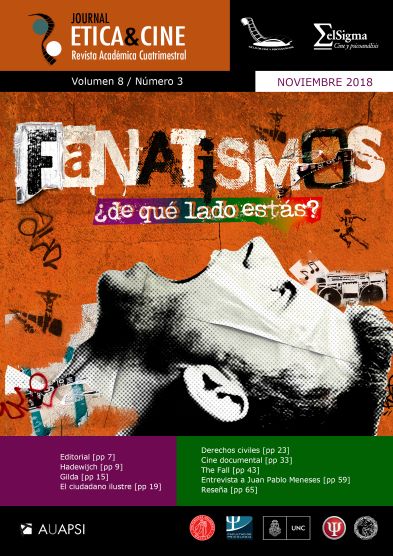To be or not to be a fan... that´s the question
DOI:
https://doi.org/10.31056/2250.5415.v8.n3.22769Keywords:
Fanaticisms, Identifications, Identity, Erotomania, SegregationAbstract
The present work seeks to think about the role played by fanaticism particularly in the musical field, in light of the contributions of Psychoanalysis of Lacanian orientation. From the reflections that the film “Gilda. I do not regret this love “, we try to arrive at some arguments that allow to give an account of the devotions that take place in this musical figure. The investigation about the origin of fanaticism, its etymology and meaning and the role it fulfills in adolescence, to be able to think about its use in extreme cases such as erotomania. The concepts of identification and identity will be in the text the conceptual knots from which to investigate the subject. On the other hand, the kinship that always linked fanaticism with religious ideas and currently with capitalist discourse, the market and consumption. It is intended to open the subject by introducing some of its possible effects, such as segregation: fanaticism does not admit the difference, although it exalts it, in such a way it constitutes a way of rejecting differences and an attempt to erase singularities. The work does not pretend to pathologize the practices of “fans”, but to open the wide range of which it is composed, as a way of thinking about the singular function that it fulfills in each subject, linked to its enjoyment and its symptom, highlighting them also as the keys of what is made refractory in the identifications.References
Freud, S. (1921 [1976]). Psicología de las masas y análisis del yo. En Obras Completas. Buenos Aires. Editorial Amorrortu.
Freud, S (1930). El malestar en la cultura. En Obras completas. México: Amorrortu.
Javaloy, F (1984). “Introducción al estudio del fanatismo”. Edicions Universitat de Barcelona. Barcelona.
Lacan, J (2003). El Seminario, Libro 8 “La transferencia”. Paidós. Buenos Aires.
Lacan, Jacques, El Seminario, Libro 24, “Lo no sabido que se sabe”. Obra inédita.
Miller, J (2005). El Otro que no existe y sus comités de ética. Paidós. Buenos Aires.
Moliner, María (2007). “Diccionario del uso del español” Editorial Gredos. Madrid.
Downloads
Published
Issue
Section
License
Los autores que publiquen en Ética y Cine Journal aceptan las siguientes condiciones:
Los autores/as conservan los derechos de autor © y permiten la publicación a Ética y Cine Journal, bajo licencia CC BY-SA / Reconocimiento - Reconocimiento-CompartirIgual 4.0 Internacional. La adopción de esta licencia permite copiar, redistribuir, comunicar públicamente la obra, reconociendo los créditos de la misma, y construir sobre el material publicado, debiendo otorgar el crédito apropiado a través de un enlace a la licencia e indicando si se realizaron cambios.

Este obra está bajo una licencia de Creative Commons Reconocimiento-CompartirIgual 4.0 Internacional.




